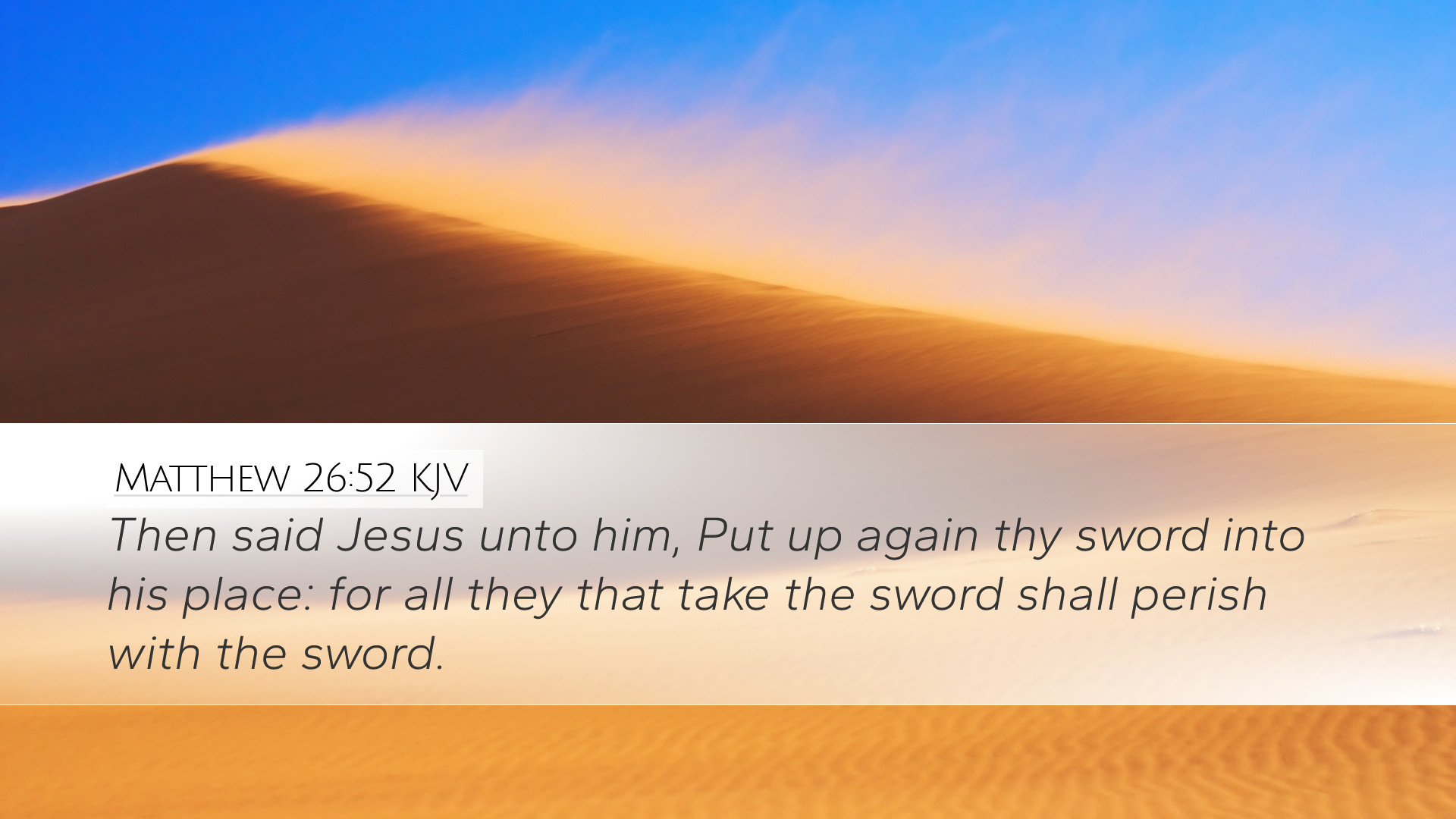Commentary on Matthew 26:52
Matthew 26:52 states:
"Then said Jesus unto him, Put up again thy sword into his place: for all they that take the sword shall perish with the sword."
Introduction
This verse occurs during the arrest of Jesus in the Garden of Gethsemane, a pivotal moment in the passion narrative. It reflects deep theological significance encompassing themes of non-violence, divine purpose, and the nature of Jesus' mission. The insights from noted commentaries such as Matthew Henry, Albert Barnes, and Adam Clarke provide a profound understanding of this scripture.
Analysis of the Verse
The directive given by Jesus to Peter has both immediate and far-reaching implications. The context and content of His response serve as a teaching moment not only for Peter but for believers throughout the ages.
Immediate Context
In the immediate context, Jesus is facing imminent arrest and betrayal, having been in prayer and preparing for the suffering that lies ahead. When Peter draws his sword to defend Jesus, he acts on a natural instinct to protect. However, Jesus responds with clarity, indicating that violence is not the way to fulfill God's purpose.
Spiritual Principles
- Non-Violence: Henry asserts that Jesus' promotion of non-violence in this verse signifies that His kingdom operates on principles contrary to the world's methods of dealing with conflict.
- Self-Control: Barnes remarks on the importance of self-control and restraint in moments of crisis, illustrating Jesus' commitment to His mission in contrast to hostility.
- Consequences of Violence: Clarke notes that Jesus' statement regarding those who "take the sword" serves as a warning about the cyclical nature of violence, suggesting that those who engage in it will ultimately face destruction.
Theological Reflections
This verse is not merely a historical snapshot; it carries theological weight. The principle articulated by Jesus is foundational for Christian ethics and community life.
Implications for Christian Conduct
- Peaceful Resistance: Jesus exemplifies a method of peaceful resistance to evil and injustice, differing from the aggressive, conflict-seeking behaviors often found in human governments and systems.
- Faith in Divine Deliverance: Jesus’ admonition reveals reliance on God's ultimate plan for deliverance, rather than human efforts. Believers are called to trust in divine intervention rather than resorting to violence.
- Witness to the World: The exhortation to "put up the sword" serves as a witness to the world about an alternative way of living that is marked by grace, mercy, and love. Clarke highlights that this reflects the core of the Gospel – reconciliation through Christ rather than vengeance.
Exegesis and Interpretation
The exegesis of this passage indicates a revolution in understanding authority and power. Jesus reframes what it means to be in control within the tumult of betrayal and arrest.
Christological Significance
Henry points out that this incident showcases Jesus as the Lamb of God, who willingly goes to the slaughter without fighting back. His acceptance of suffering demonstrates the fulfillment of prophetic scripture and God's redemptive plan.
Historical Context
In a Jewish context, swords were often associated with rebellion against Roman occupation. Jesus' instruction to refrain from violence turns the expected actions of a messianic figure upside down, underscoring His role as the Prince of Peace, instead of a military leader.
Practical Application for Believers
For pastors, theologians, and students, this verse serves as a clarion call to embody the principles of Christ, especially in contentious social and political climates.
Call to Non-Violent Activism
The implications for social justice can be profound. Followers of Christ are called to engage in non-violent activism, advocating for justice and righteousness while adhering to the teachings exemplified by Jesus.
Reflection on Anger and Conflict
This verse invites personal reflection on how believers respond to anger and conflict. It challenges individuals to consider how they may inadvertently add to cycles of violence through their actions and reactions.
Conclusion
Matthew 26:52 encapsulates the essence of Jesus' radical approach to conflict and power. The insights from classical commentaries continue to be relevant today. As we reflect on Jesus' words, we are called to put down our swords and follow in the path of love, grace, and peaceful resistance, modeling our lives after the One who chose suffering for the sake of humanity's redemption.


